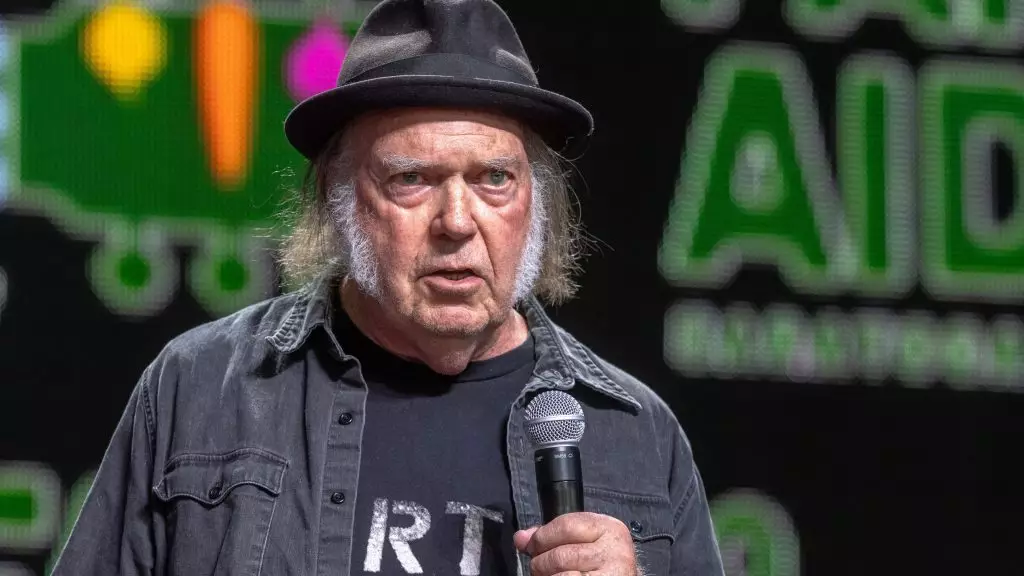Neil Young, an iconic figure in the music world, has recently made headlines with his back-and-forth stance regarding his participation in the Glastonbury Festival. Initially, Young had decided against performing at the renowned event, a decision he attributed to concerns over corporate influences, particularly involving the BBC. However, just hours after this declaration, the legendary musician announced a change of plans, stating that he would, in fact, be performing at the festival as part of his tour. This unexpected turn showcases Young’s inherent unpredictability and the complexities that often surround artistic decisions in the music industry.
A Misunderstanding in Communication
Young’s abrupt reversal can be primarily traced back to what he described as an error in the information he received. In his announcement on his official website, he expressed joy at the festival’s inclusion in his schedule, noting his long-standing affection for Glastonbury. The artist’s initial rejection of the festival was rooted in his belief that it had succumbed to corporate control, which he felt contradicted the spirit of the event. His remarks underscore a broader concern artists have with commercialization in the industry—especially when dealing with major corporate entities like the BBC.
This situation raises vital questions about the transparency and communication between artists and event organizers. It illustrates how easily miscommunication can lead to significant public fallout, particularly in today’s media-driven world where speculation can spiral out of control. Ultimately, Young’s misunderstanding has not only brought him back to the festival stage but has provided a lesson on the importance of clear dialogue.
The Glastonbury Festival, famed for its eclectic lineup and vibrant atmosphere, has not been free from criticism, especially regarding its partnerships. Neil Young’s skepticism towards the involvement of the BBC is understandable given the corporation’s prominence in shaping public perception of the festival. Young previously expressed dissatisfaction with the BBC’s coverage of his performance back in 2009, where only a fraction of his concert was aired. His assertion that Glastonbury is now “under corporate control” reflects a broader trend within the entertainment industry, where profit motives sometimes eclipse artistic integrity.
The controversy surrounding corporate sponsorship extends beyond just this isolated incident. Many artists grapple with the dichotomy of wanting to reach wider audiences while also fearing the dilution of their artistic vision. Young’s decision to step back from Glastonbury was not just a reflection of his personal principles but also an indication of the broader tensions in the music industry regarding corporate involvement.
The rapid dissemination of information via social media platforms also plays a crucial role in the public perception of artists and events. Young’s announcement came at a time when clarity and honesty are highly valued by fans, who are often quick to react, share, and discuss developments. Glastonbury organizer Emily Eavis expressed enthusiasm for Young’s return via Instagram, demonstrating how social platforms can serve as direct channels of communication between artists and audiences.
Moreover, the mixing of social media and musical performances has quickened the pace at which artists and event organizers interact with their followers. This can lead to beneficial outcomes, such as increased engagement, but can also foster misunderstandings, as seen in Young’s experience. In an age where public perception can change in an instant, both artists and organizers must tread carefully in their communications.
Neil Young’s stance against partnerships he perceives to be detrimental is indicative of a larger and ongoing conversation about artistic integrity in a modern context. His previous actions, like pulling his music from Spotify over ethical concerns, underline his commitment to his beliefs. In today’s climate, where streaming services and large corporations dominate, Young’s principled framework invites a dialogue on what it means to stay authentic.
As the Glastonbury Festival approaches, fans eagerly anticipate Young’s performance, having followed this riveting saga. Ultimately, the festival remains a significant cultural event, irrespective of its corporate ties. For Neil Young, the journey back to Glastonbury encapsulates the challenges and nuances of contemporary artistry, a fascinating interplay between personal values, public relations, and the corporate influences that shape the modern entertainment landscape.

